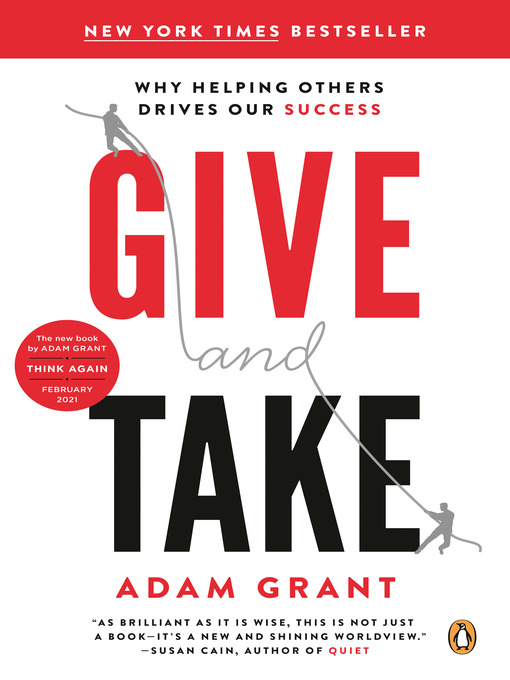
Give and Take
Why Helping Others Drives Our Success
کتاب های مرتبط
- اطلاعات
- نقد و بررسی
- دیدگاه کاربران
نقد و بررسی

January 21, 2013
Contrary to popular belief, good guys don’t always finish last, and, in fact, an altruistic mindset can help people get ahead professionally. Whenever we interact with others in a business situation, we need to decide how to comport ourselves: focus on our own goals, or give without worrying what we’ll get in return. A giving personality has the power to launch a career or deep-six it. Wharton professor Grant uses psychology and behavioral economics to explain how and why givers can succeed or fail. While takers are often very successful (Ken Lay, for example), they frequently lose credibility. Givers, on the other hand, are better salespeople and are more likely to be believed. Grant shares the stories and philosophies of givers and takers, including comedian George Meyer (a writer and executive producer for The Simpsons) and Craig Newmark of Craigslist. Through Grant acknowledges that taking is sometimes necessary, for most people, giving is not only the best way to succeed professionally, but to be happy. Ending with “actions for impact” so readers develop the right mix of mostly give and some take, Grant drives home programmer and networking genius Adam Rifkin’s five-minute rule: “You should be willing to do something that will take you five minutes or less for anybody.” Agent: Richard Pine, Inkwell Management.

April 1, 2013
A scholarly discussion on the push and pull of business ethics. Do good guys really finish last? Grant, an organizational psychologist and prominent Wharton professor, hopes to convince readers otherwise with a book chock full of testimonial stories from businessmen and social scientists on the pros and cons of both giver and taker mentalities. Attitudes in the workplace, he writes, tend to be predominantly of the "matcher" variety ("governed by even exchanges of favors"), whereby a reciprocal balance is strived for and looks good on paper but isn't always achieved. He notes that givers are looked upon as too soft and trusting, while takers are perceived as callous and hyperdominant. The author provides lively, supplemental case histories from industry givers and takers, like Enron scandal kingpin Kenneth Lay, benevolent online entrepreneur Adam Rifkin and Craigslist's Craig Newmark, as well as lawyers, hip-hop magnates, teachers and historical greats like Abraham Lincoln and Frank Lloyd Wright. Grant seeks to persuade readers that altruistic givers are too-often underestimated in the business arena, and while some play doormats, many become uniformly successful. He explores the productive nuances of business networking, customer-relationship-building, and practiced, effective communication. In cross matching their characteristics, Grant intimates that there are attributes to be gained in business and career management by being a giver or taker, but he recognizes that a smart combination of both will prove the most effective. He offers "Actions for Impact" to best apply his principles, and his approach is consistently prosocial for readers in every aspect of the business world. Slick strategies and a fresh approach for business professionals wishing to tip the scales of reciprocity.
COPYRIGHT(2013) Kirkus Reviews, ALL RIGHTS RESERVED.

May 1, 2013
Grant's (Wharton Business Sch.) "give and take" concept centers around the idea that the success of those who seek to give more than they take is underestimated. By citing examples from social experiments and his personal experience in advertising and by asserting the benefits of modest communication and networks built on generosity rather than reciprocity, he shows how the behavior of successful givers differs from that of unsuccessful givers. He concludes with ten actions for impact, a set of concrete steps for readers to enhance the giving mindset. VERDICT For fans of Malcolm Gladwell and Daniel Pink, and of The Power of Habit and Quiet. Grant's ideas decry the popular perceptions of high achievers as calculating and callous takers, but his dry, repetitive use of supporting science may fail to engage the lay reader.--Steven Wilson, Galen Coll. of Nursing Lib., Louisville
Copyright 2013 Library Journal, LLC Used with permission.

April 1, 2013
An academic, Grant explains that added to hard work, talent, and luck, highly successful people need the ability to connect with others. We learn givers give more than they get, takers get more than they give, and matchers aim to give and get equally; all can succeed. The author's aim is to explain why we underestimate the success of givers, to explore what separates giver champs from chumps, and what is unique about giver success. Emphasis on teams and the rise of the service sector offers givers access to opportunities that takers and matchers often miss. In the first section, the author explains his principles of giver success, and, in the second part, with insightful stories he explores the costs of giving and how givers can protect themselves against burnout and becoming pushovers; helping others does not compromise success. Grant concludes with his hope that this book will provide his young daughters' generation with a new perspective on success. A worthy goal for this excellent book.(Reprinted with permission of Booklist, copyright 2013, American Library Association.)

























دیدگاه کاربران